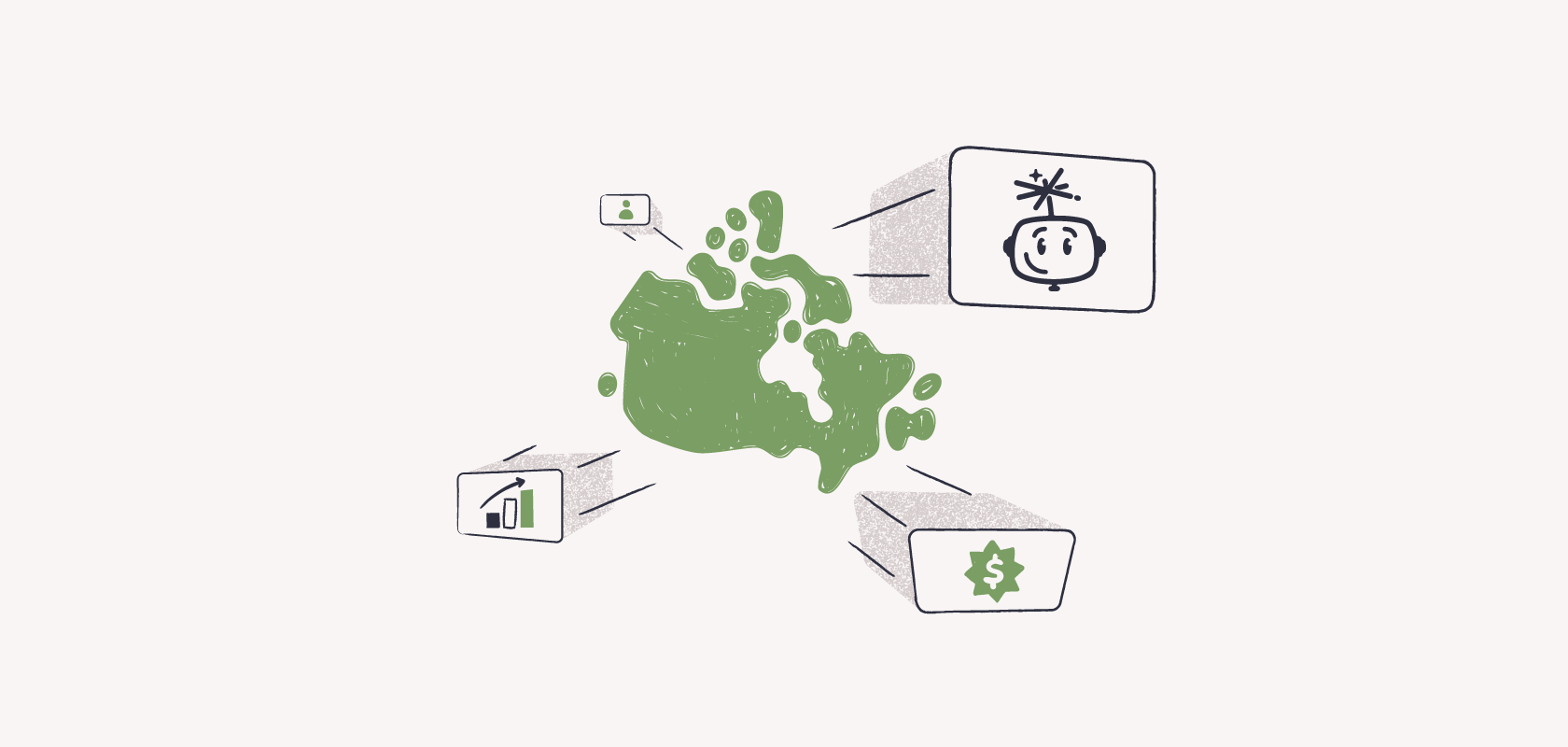Become an insider!
Get our latest payroll and small business articles sent straight to your inbox.
On March 28, 2023, the government released its federal budget for 2023, titled “A Made-in-Canada Plan: Strong Middle Class, Affordable Economy, Healthy Future” (Budget 2023, for short). As inflation has created significant financial hardships for many Canadians, Budget 2023 proposed measures to provide various relief to both small businesses and individuals, while simultaneously tightening certain tax loopholes.
High-level summary of Canada’s 2023 federal budget.
Record low unemployment rate
Although Canada still faces many challenges as it continues to recover from the COVID-19 pandemic, the new federal budget has a positive economic outlook for Canada. With its unemployment rate reaching record low, Canada’s economic growth resulted in 830,000 more Canadians being employed compared to when the pandemic started back in 2020. With an ever-growing population and the strengthening of the labour market, the federal government believes that Canada is well positioned to face any economic uncertainties to come.
Inflation remains elevated
Although commodity prices have started to decrease, Canadians are still facing the effects of higher grocery and housing costs. How long these high interest rates will stick around isn’t known. Because of that, the Federal Budget for 2023 aims to provide some level of inflation relief to those most significantly impacted by this global issue.
As the Government of Canada aims to soften the economic impact to Canadians through these new incentives, there’s an expected increase to spending commitments aimed at boosting the economy. But, coupled with the weakened economic outlook, it’s anticipated Canada will see higher-than-expected deficits for the next five years.
Overall, Budget 2023 seems to place a heavier focus on supporting lower and middle-class Canadians. For this reason, the Canadian Federation of Independent Business (CFIB) believes that more could have been done to support small businesses and sees missed opportunities in the federal budget for Canada, such as extending repayment deadlines for Canada Emergency Business Account (CEBA) loans.
As of February 2023, approximately 57% of small businesses have not yet repaid the various debts it had taken on due to the COVID-19 pandemic. The average debt for these small businesses stands at $105,000 where CEBA loans make up a large portion of it. Unfortunately, less than half of small businesses seem to have had their sales return to pre-pandemic levels to be able to repay the loan.
Despite this, there seem to be no additional plans for the federal government to extend the CEBA loan repayment due date. We’ve seen this in our own clients here at Zenbooks, and an extension on the COVID-19 debts would have been a sigh of relief for the business community.
New programs and incentives to support small business owners.
Although an extension on repaying CEBA loans doesn’t look to be in the cards, the Government of Canada is implementing and proposing the following programs and incentives to support small businesses.
Lowering credit card transaction fees for small businesses
With many businesses transitioning to a non-cash transaction policy, the fees to process credit card transactions have become a huge financial burden on small businesses. As such, the federal government has worked closely with the payment card industry to secure lower fees from Visa and Mastercard for small businesses. It’s estimated that more than 90% of businesses that accept credit cards will have their interchange fees reduced by up to 27% on average.
This is great news for Canadians and small business owners! More details are to be released by the Government in the coming weeks regarding this endeavour.
Deduction for tradespeople’s tool expenses
Employed tradespeople receive tax deductions for tools that they purchased as a condition of employment. Budget 2023 proposes to double this employment deduction from $500 to $1,000, effective for 2023 and subsequent taxation years.
Review of the Scientific Research and Experimental Development (SR&ED) Tax Incentive Program
The Government is in the process of reviewing the SR&ED program to ensure adequate benefits are being provided to the eligible applicants and is considering adopting a patent box regime.
A patent box regime is a tax relief incentive whereby income earned from the use of qualified intellectual property assets enjoy a reduced income tax rate. The Department of Finance will continue to explore the next steps in the coming months. This is an interesting program that would very much foster innovation from small businesses.
Proposal for refundable tax credits on qualifying investments for use in manufacturing and processing in Ontario
For Canadian Controlled Private Corporations (CCPC) that invest in buildings, machinery and equipment for manufacturing or processing goods in Ontario, a 10% refundable tax credit is proposed for qualifying investments made up to $20 million. In other words, there’s $2 million of tax credits per year available.
Budget impacts for individuals.
To address the issue of affordability that many Canadians are facing, the federal government proposed several relief measures in Budget 2023, while also enforcing stronger tax policies for high-income individuals paying low taxes in Canada.
Making housing more affordable
Starting April 1, 2023, financial institutions will start to offer the tax-free first home savings account (FHSA). Contributions to the FHSA are limited to $8,000 per year to a maximum of $40,000.
This new savings account enables taxpayers to receive a deduction to their income (much like a Registered Retirement Savings Plan (RRSP)), while any funds added to this account will remain tax-free (similar to the tax-free savings account (TFSA)). Even withdrawals are tax free!.
The Canadian federal budget also addresses other ways the Government is attempting to make housing more affordable for Canadians, such as putting limitations on foreign investors, incentivizing builders to build more houses and doubling the first-time home buyer’s tax credit from $5,000 to $10,000.
A new grocery rebate for Canadians
Canadians with a low or modest income already receive tax-free quarterly payments from the government to offset the GST/HST that they pay. To help relieve the financial burden of rising grocery costs, the federal government proposes a one-time grocery rebate in addition to the GST/HST credit.
The rebate will be a maximum of $234 for a single individual and $306, plus $81 per child, for a family household. Although these aren’t large dollar figures, Budget 2023 suggests that it’ll provide inflation relief to 11 million Canadians and families.
Alternative Minimum Tax (AMT) for high-income individuals
Currently, certain high-income individuals have a minimum tax in circumstances where their federal income tax payable ends up being less than an expected “minimum amount.” The following changes are proposed to come into effect in 2024 to ensure that high-income Canadians continue to pay their fair share of taxes even after making use of various tax benefits available to them. It’ll also ensure that middle-class Canadians will not be unfairly targeted by the minimum tax rules.
The changes would be as follows:
- An increase in the AMT rate from 15% to 20.5%
- An increase in the AMT exemption amount from $40,000 to $173,000
- In calculating income for AMT purposes, a disallowance of various deductions and expenses by 50%, while raising taxes on capital gains (including on donations of listed public securities).
We believe this will directly target high income individuals who hire great accountants that understand the myriad of deductions available, who benefit from lower average tax rate.
Changes to the Registered Education Savings Plan (RESP)
Despite the increasing tuition costs for post-secondary students, the withdrawal limits on RESPs have surprisingly not changed for 25 years. To improve affordability of education for students, Budget 2023 proposes to increase the withdrawal limit as follows:
- For students enrolled in full-time programs, an increase in Educational Assistance Payments (EAP) withdrawals to $8,000 from $5,000 per 13-week period of enrollment.
- For students enrolled in part-time programs, an increase in EAP withdrawals to $4,000 from $2,500 per 13-week period of enrollment.
Furthermore, the federal government will now allow divorced or separated parents to be able to open a joint RESP account for their children (effective as of March 28, 2023).
Interesting 2023 federal budget bits.
From Budget 2023’s various initiatives, a few intriguing proposals caught our eye. The federal government seems to be taking some surprising steps to try and improve the lives of Canadians, while implementing stricter tax policies for certain businesses. Here are a few that you might find interesting:
Automatic Tax Filing
The Canada Revenue Agency (CRA) has provided the File My Return automated tax filing service to eligible Canadians with simple tax situations since 2018. Approximately 53,000 tax returns were filed using this service in 2022, and the federal government aims to improve its eligibility criteria so that up to 2 million Canadians would be able to use this service by 2025.
The CRA is also looking towards piloting a new automatic tax filing service so that Canadians who currently do not file their taxes will be able to receive financial benefits that come with filing the tax returns. Lots of homeless, low-income or students would very much benefit from this initiative.
Fair taxation of dividends received by financial institutions
In the current Canadian tax system, corporations generally don’t pay taxes on dividend income earned from shares of Canadian corporations. Financial institutions (such as banks and insurers) have also enjoyed this benefit, effectively lowering their overall tax burden each year.
The 2023 federal budget highlights an inconsistency in how financial institutions have been tax-exempt on dividend income earned in their ordinary course of their business. For this reason, the federal government proposes that dividend income earned by financial institutions after 2023 should be treated as business income and taxed appropriately.
This is a rather unexpected proposal that’ll have a material earnings impact on financial institutions. In other words, their bottom line or net profits will be impacted, and it’s predicted that this measure would add $3.15 billion to federal revenues over five years starting in 2024.
Tax credit incentives for clean energy and clean technology
With the goal of creating a sustainable and clean economy, Budget 2023 proposes extended incentives for processing of clean energy and manufacturing of clean technology. There’ll be certain labour requirements to meet in order to qualify for the full credit.
When Zenbooks asked the Business Development Bank of Canada (BDC) about this proposal, they seemed excited about the changes. Kevin Albert, Associate Principal of the Climate Tech Fund stated the following.
At a time when climate change is rapidly accelerating, the new Clean Investment Tax Credit will spur investment in Canada’s clean technology industry and help propel Canadian clean- and climate tech champions into global leaders. As one of the largest and most active Climate investors in Canada, BDC is also here to help these firms reach their full potential and support Canada on its path to net zero.
— Kevin Albert, Associate Principal of the Climate Tech Fund, BDC
Overall, the federal budget for 2023 seems to showcase the Canadian government’s commitment to investing in key areas such as climate action, healthcare and economic recovery, while also addressing ongoing challenges related to the COVID-19 pandemic. We are hopeful to see further ongoing support for Canadian small businesses in the near future as well.











